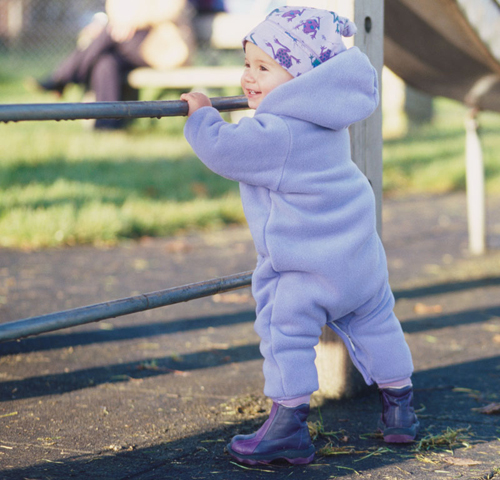Your Premature Baby
If your baby was born
prematurely, she may have spent time in a neonatal intensive care unit.
Such a challenging start is bound to impact the early years of
parenting, but it is important to try to come to terms with and handle
your feelings.
“I can reassure you that most premature babies catch up on their development during the toddler years.”
Your baby was born early,
so she will reach her first birthday at a slightly earlier stage of
development than babies who were born at 40 weeks. For example, if she
was born six weeks prematurely, she will be only 101/2 months in
development terms on the day you light that first birthday candle. A
week can be a very long time in toddler terms and it can be helpful to
remember to subtract those early birth weeks from estimated ages and
stages of development and to focus instead on enjoying and celebrating
each of your child’s small achievements.
Your child’s
developmental milestones will be the same as other children’s, although
they may occur at a slightly later calendar date. And the good news is
that most children who are born prematurely will have “caught up” by the
time they are 2–3 years old and will benefit from your encouragement to
enjoy toddlerhood to the fullest.
Natural anxieties
It is normal to feel anxious
if your baby was born prematurely. You will have probably dealt with a
whole range of challenges during the first twelve months: you may have
been unable to breast-feed, and may not have been free to hold or touch
your baby as you would have liked; she may have had breathing
difficulties or been ill. Even though you have been told that she will
“catch up,” you may wonder whether she will lead a “normal” life.
During the early months
you will have had to handle a whole range of difficult emotions:
feeling robbed of a natural birth and precious time with your newborn;
constant worries about your baby’s health; and fears of loss and death.
Letting go
Try not to let anxiety connected with the past curtail your
child’s enjoyment of life. Keep safety in mind, but remember that
toddlers will only learn through exploration.

Talk about your fears
Your thoughts and
feelings about the past will influence your current feelings and actions
toward your toddler, and will therefore affect the way she relates to
you. It is normal to feel so grateful that your child has survived that
you feel unable to reprimand or manage her behavior as she grows older.
It can be helpful to talk
about your experiences, so that you are conscious of how they are
influencing the present day. Keeping in contact with other parents of
premature babies can be helpful, since they will be encountering similar
issues. Specific guidance will be available from your pediatrician or
you can consult a specialized organization .
Attachment
Some parents will
find that the impact of seeing their baby so small and vulnerable during
the first weeks of life will make them cautious about holding or
touching their baby, even when she is older and stronger. This in turn
may mean that your baby does not become used to being touched or held.
Physical
closeness and cuddling are very important elements in a baby’s
development, and a lovely way to help reduce her anxiety, making her
feel safe, and nurtured. If cuddles have been absent up until now, begin
to give your toddler hugs and gentle massage—but take it slowly. Every
baby has different needs—she will soon show you what she enjoys and what
she doesn’t, so follow her lead.
As your child grows
Health concerns may
have dominated the first twelve months, but now your toddler is getting
older and stronger you can start to let her play and explore. Focusing
on enjoying silliness and playtime, instead of on health issues, can
help reduce anxiety, too.
Try to remind yourself
that even though your child may seem vulnerable and smaller than average
during her early years, she will need the same clear and loving
behavior boundaries, and eating and sleeping routines, that apply to all
children. This period of transition may be a challenge for you and your
toddler. Other parents will help you gain perspective concerning
“normal” progress and problems.
Only 15 percent of mothers who have a premature baby are likely to have another baby prematurely.
Real life
My daughter Rachel was
just 3.7 lbs when she was born prematurely. The first year of Rachel’s
life was full of mixed feelings and anxiety. Every time she cried or
refused the bottle I worried that she was about to die. I was paranoid
about cleanliness and warmth and found it really hard to accept that she
was genuinely well and healthy. I was so terrified of losing her that I
found it hard to let myself love her or show affection in case she was
snatched away. Looking back, I feel as if I lost the first 12 months of
her life, which makes me feel very sad and all the more determined to
make up for lost time. Now, at almost two years old, Rachel is showing
immense strength of character and determination. She definitely rules
the household—and we feel so grateful to have her, although because of
my experience I am still quite fearful of having another child.